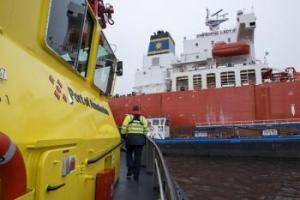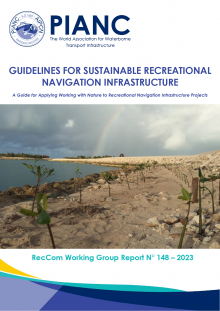Harbour Master
Harbour Masters
Worldwide there are approximately 3,000 merchant ports and the work of the Harbour Master can vary widely from country to country and from port to port even within the same country.


This report announced on 18 April provides guidelines for the sustainable development of recreational navigation infrastructure (RNI).
According to the publisher PIANC there are multiple potential benefits of recreational navigation infrastructure, but it is critical for sustainable development that these opportunities become actual benefits.
This report provides guidelines for a design process and illustrates project features that can achieve this goal. It also outlines the benefits that sustainable RNI provide, as an economic engine with social and environmental benefits, in sustainable tourism, in large infrastructure projects, in urban waterfront projects, and as part of broad conservation strategies.
Here it is important to note that we indicate our part in creation of this publication for on behalf of IHMA Captain Yoss Leclair, Immediate Past President, worked on the publication’s development.
Analysis of concerns
The report identifies and provides analysis of typical concerns that are faced in the practice of achieving environmental sustainability in this type of projects. This Working Group addressed practical concerns and actual implementation challenges, rooted in experience. It discusses the opportunities for synergies with the environmental impact study process and the conflicts when principles and practical approaches are not adequately aligned.
Guidance is also provided for the implementation of innovative solutions to achieve environmental, social, and economic sustainability. The report describes the alignment between Best Practices in marina design and Working with Nature and provides case studies. It includes highlights of 15 projects that illustrate environmental design features, as well as examples of innovative design process implementation and of successful regulatory processes.
A Guide for Applying Working with Nature to Recreational Navigation Infrastructure Projects
Working with Nature (WwN) philosophy provides a powerful approach to achieve sustainable infrastructure development, by highlighting the planning process recommended to achieve sustainability goals.
The PIANC Working Group report No. 176 Guide for Applying Working with Nature to Navigation Infrastructure Projects provides guidance beyond the first principles established in the WwN position paper. This report focuses specifically on to recreational navigation infrastructure projects. There are opportunities and issues in the implementation of WwN that are specific or more commonly found in this type of projects because their intrinsic value can be enhanced by environmental and social attributes.
This report builds upon the general WwN guide to address issues that are specific to RNI and may also apply generally to smaller organizations managing multi-purpose facilities with a recreational or tourism function.
These guidelines can also be used to evaluate the adherence to Working with Nature (WwN) by recreational navigation infrastructure (RNI) projects.
For more information and to place orders readers are invited to see here:
Founded in 2017, MarineLabs delivers high-resolution, real-time, and historical wind, wave, and weather data, as well as hyper-local 10-day forecasting, from a growing network of cloud-connected, rugged sensor nodes.
The International Harbour Masters Association (IHMA) and the Port of Rotterdam Authority are pleased to announce the 15th International Harbour Masters Association Congress, to be held from 09–12 June 2026 at Theater Zuidplein in Rotterdam.